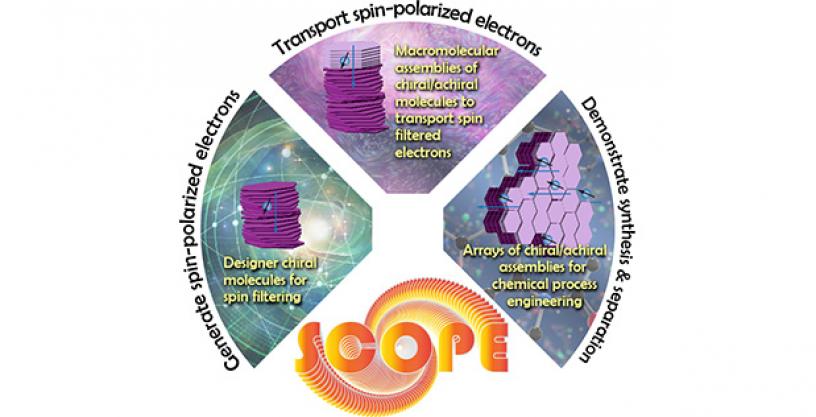
New program aims to exploit electron spin as a control variable for efficient chemical synthesis
Mar 14, 2023
The annual demand for medical countermeasures (MCMs) in the Department of Defense is on the order of hundreds of grams, but current manufacturing methods for MCMs are only efficient at large scale (hundreds of kilograms to tons). This disparity in scale leads to cost premiums, a fragile supply chain, and poor resilience during emergencies such as natural disasters and pandemics.
To address these challenges, DARPA's new Spin-COntrolled chemical Process Engineering (SCOPE) program aims to develop technologies that would enable small-scale distributed manufacturing of MCMs and their raw materials with very few byproducts. The goal of the program is to use electron spin as a novel control variable to demonstrate high-yield synthesis and separation of fine chemicals required for manufacturing critical medicines.
“Traditional chemical synthesis methods leverage control variables such as pressure, concentration, and temperature to drive product formation,” said Vishnu Sundaresan, SCOPE program manager in DARPA’s Defense Sciences Office. “These approaches often lead to the formation of unwanted byproducts that require separation from the desired product. Purification of the target product from chemical byproducts is inefficient and expensive at small scales and can result in a 400X cost premium for Defense Department annual demand.”
Although electron spin is a known fundamental property for controlling how raw materials combine to form products in a chemical reaction, limited technical approaches exist to exploit electron spin at scale.
“Through SCOPE, we aim to develop tools that use electron-spin currents as a control variable in direct high-purity chemical synthesis,” Sundaresan said. “By eliminating the purification step, we can imagine a future where various drugs can be produced in a local pharmacy from a common set of ingredients and without the need for a large-batch purification process. If successful, SCOPE will enable the production of 1-10 doses at a time in a desktop gadget similar to a printer and supply warfighters with life-saving drugs in forward operating bases. In addition, this technology has the potential to supply critical drugs to remote rural communities as well as support the medical needs for human space missions.”
SCOPE is a two-year effort that comprises two 12-month phases: a feasibility study phase and a proof-of-concept phase. All awards will be made in the form of an Other Transaction (OT) for prototype project.
For technical details and proposal instructions visit the SCOPE Disruption Opportunity solicitation at SAM.gov: https://sam.gov/opp/2d5f19ce35f8496994b2ba6f07f27e49/view.
# # #
Media with inquiries should contact DARPA Public Affairs at outreach@darpa.mil
Associated images posted on www.darpa.mil and video posted at www.youtube.com/darpatv may be reused according to the terms of the DARPA User Agreement.
